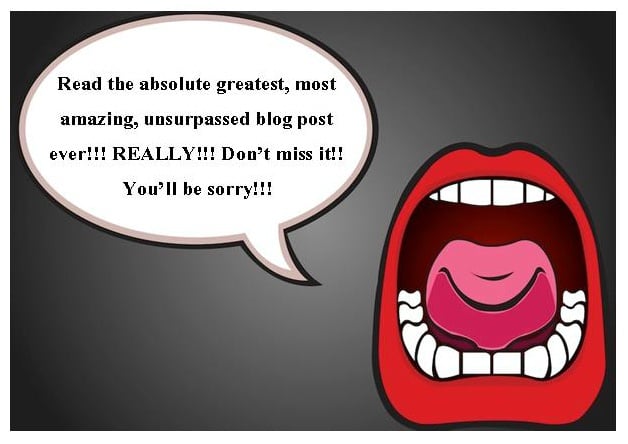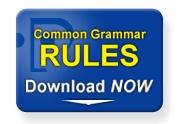 With the presidential election cycle in full swing and local elections taking place this week, now seems the best time ever to talk about hyperbole in marketing copy. Or not. Maybe it’s just a good time to talk about it. After all, political campaign ads are the epitome of hyperbole.
With the presidential election cycle in full swing and local elections taking place this week, now seems the best time ever to talk about hyperbole in marketing copy. Or not. Maybe it’s just a good time to talk about it. After all, political campaign ads are the epitome of hyperbole.
Hyperbole is extravagant exaggeration, and you see it everywhere — on television, in print, online, in ads, in the news, in email, in social media posts. We see it frequently in marketing, PR and campaign materials that come through ProofreadNOW.com.
Why is hyperbole a problem, especially if it leads the audience to remember what was said? Because memorable does not equal believable. Although hyperbole can indeed make a product, service or campaign memorable (think Donald Trump), it erodes the very quality you want to build among current and prospective clients or customers: trust (think Donald Trump). Plus, it can leave a bad taste in your mouth (think Dona… oh, never mind).
Is all hyperbole bad? No, it can actually be an effective device when used sparingly or humorously and when your readers/viewers are in on what you’re doing. Allstate’s “Mayhem” commercials and Dos Equis’ “The Most Interesting Man in the World” ads are good examples. But the device loses much of its impact when used excessively — like Dad telling the same tired jokes at every family gathering.
When writing marketing copy, make it relevant and cut the hype. The four tips below can help.
1. Suppress Superlatives and Buzzwords
It was the best of times. It was the worst of times … and apparently still is. Five years ago, Adam Sherk wrote an excellent blog post on the most overused buzzwords in press releases. Using his same method of checking the press release archives on PRWeb.com, I decided to see whether we’ve made much progress. We haven’t. I checked only his top five (of 100) overused words and found the abuse to be ongoing and actually worse. Much worse …
Most Overused Buzzwords
|
2010 |
2015 |
|
leader — 161,000 |
best — 865,000 |
|
leading — 44,900 |
top — 693,000 |
|
best — 43,000 |
leading — 354,000 |
|
top — 32,500 |
unique — 236,000 |
|
unique — 30,400 |
leader — 167,000 |
Sometimes, obviously, such words are called for (e.g., reporting the results of a Best in Show competition). But more often than not, these have become our go-to words because, let’s face it, they’re easy. When tempted to use these or any of the other words on Adam’s list in your marketing/PR copy, ask yourself if there’s a fresher, more creative way to make your point.
2. Exclude Exclamation Points!
Whether you use exclamation points to exclaim, to generate excitement or to create a sense of urgency, use them sparingly. Better yet, eliminate them altogether. Using too many of them or using them frequently has the opposite effect of what you’re likely trying to achieve — making readers oblivious to them, irritated by them or, worse, angry when they discover the offer doesn’t match the hype (e.g., 60% off EVERYTHING!! Except for the exclusions in the fine print …).
3. Cite Sources
If your marketing copy claims that your product is the best thing since sliced bread, be prepared to answer the question, “Who says?” You can back up your claim with research, surveys, testing, case studies or client testimonials, among other forms of substantiation. Just be sure your proof is specific and that it supports your claims. That’s how you build trust.
4. Cut Clickbait
Clickbait is headlines or text that sound too outrageous to be true, and yet … we click on them. You know the kind:
ROARsome fares from $19 (Funny … I can never find one to the place and on the dates I want to go).
FLASH sale! Today only! (They do this every week.)
20% off — 2 DAYS ONLY! (The sale was supposed to end Monday night; an email the next day extended it to 9 a.m. Tuesday, and an email Tuesday extended it to midnight that night.)
Never eat this fat-storing dangerous carb (EVER)! (Upon opening the email, I see I have to click on a link to find the answer. I already know it’s going to take me to a really long, smarmy online video pitch to talk me into buying some revolutionary weight-loss product. Puh-lease.)
I pulled the above headlines randomly from my email inbox (a thorough cleaning/exorcism really is in order). If you have a truly wonderful offer, by all means talk it up in the headline and intro text. But if you’re just trying to hook consumers into clicking through, you’ll have a tough time building that whole trust thing we talked about earlier.
Is hyperbole in marketing copy the greatest evil of all time? Well, no. But it is seriously annoying, can compromise your ability to build trust and, ultimately, will cost you clients or customers. Use it wisely.
Let us know in the comments below about any egregious examples of hyperbole you’ve encountered OR about instances when you’ve seen it used effectively.




